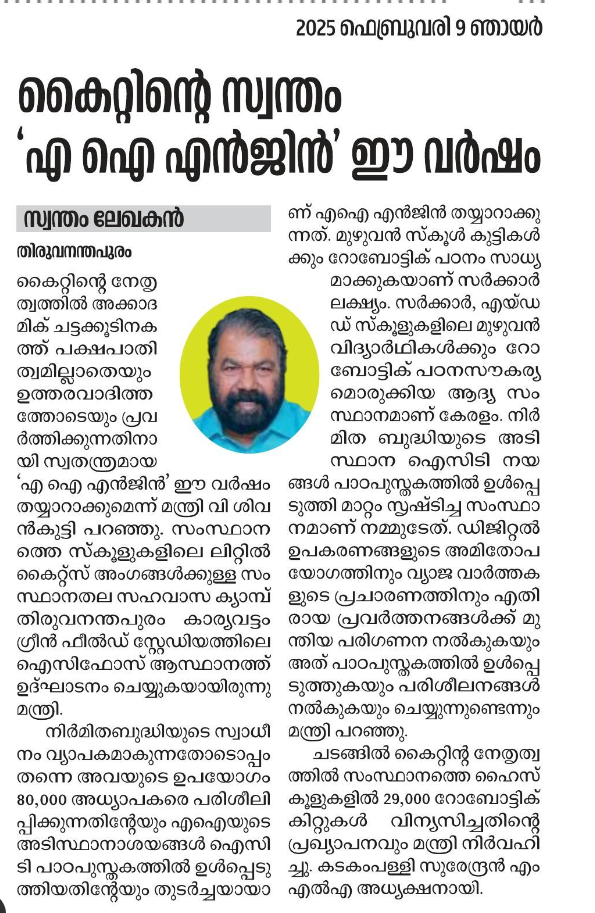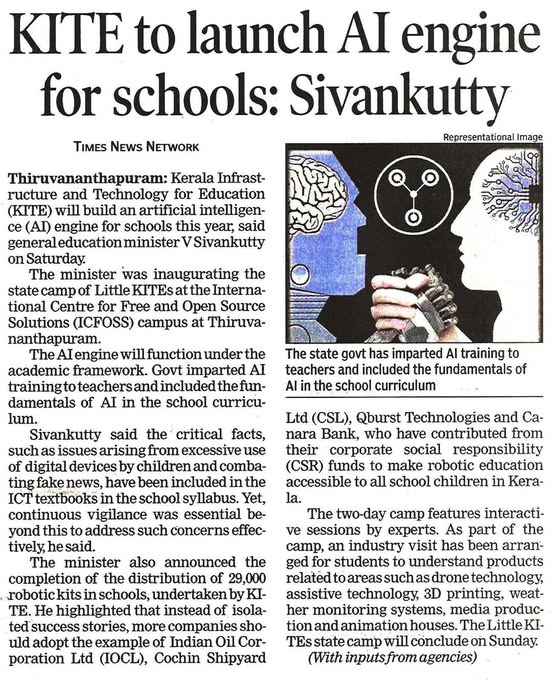There’s been a recent surge in news reports about schools, including those in Kerala, incorporating AI into classrooms. For example this news titled “Kerala School Introduces IRIS: India’s First AI Teacher Robot”
Today, I learned about a teacher training program organized by the Kerala Education Department. The program focuses on training teachers before students on AI tools.
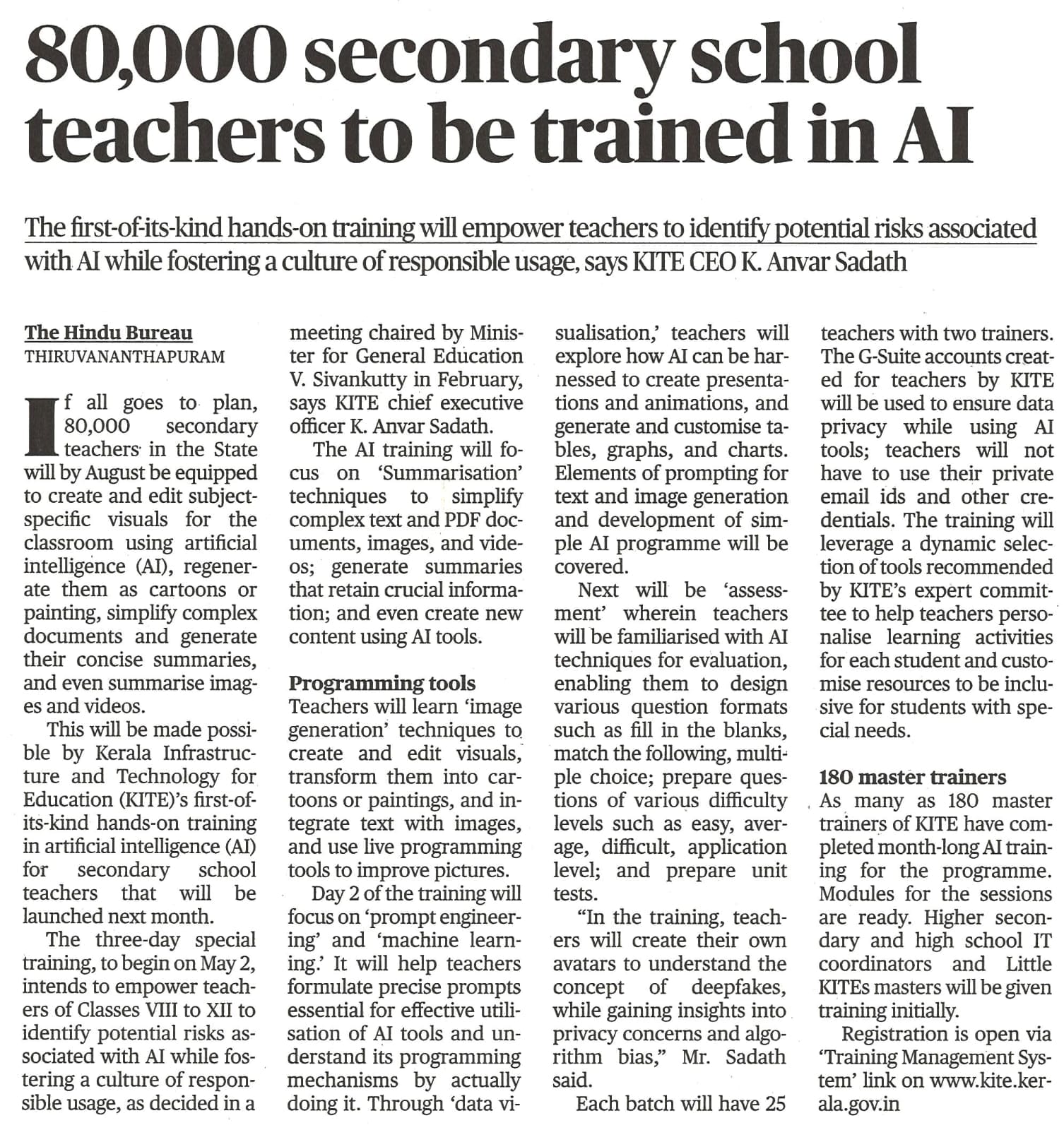
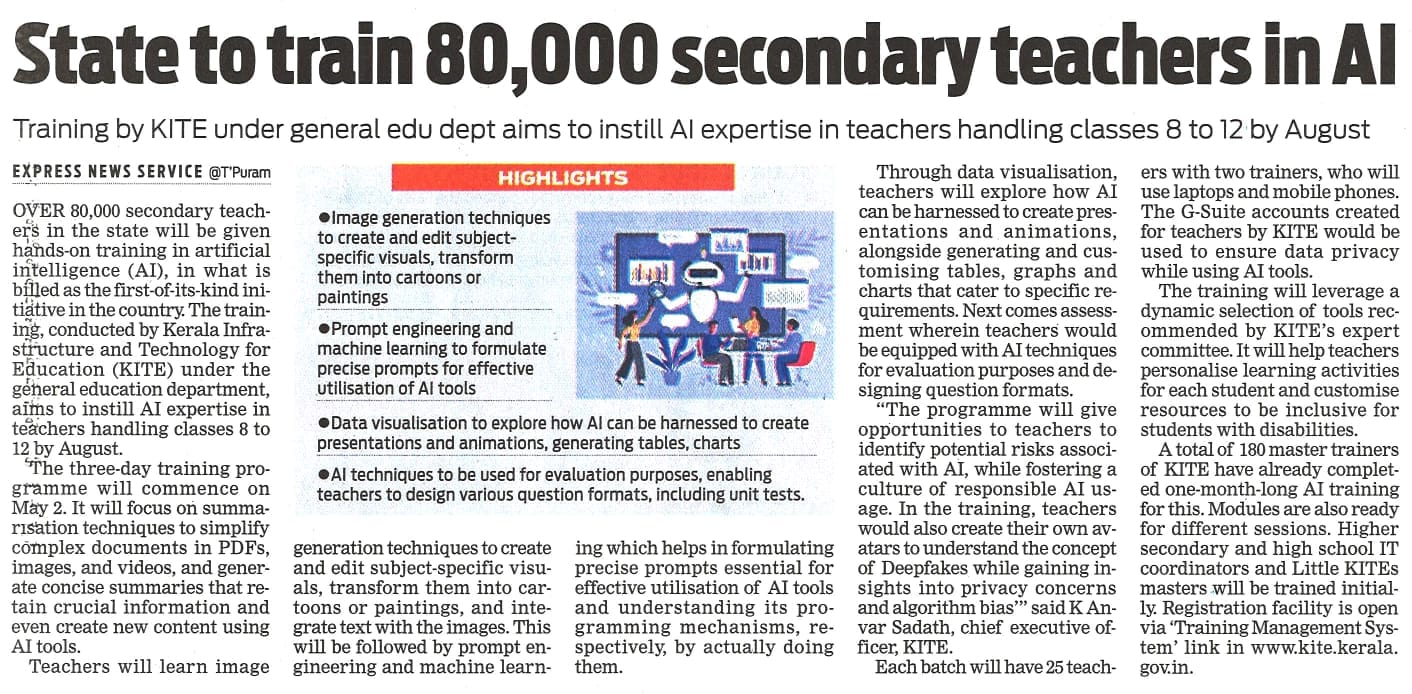
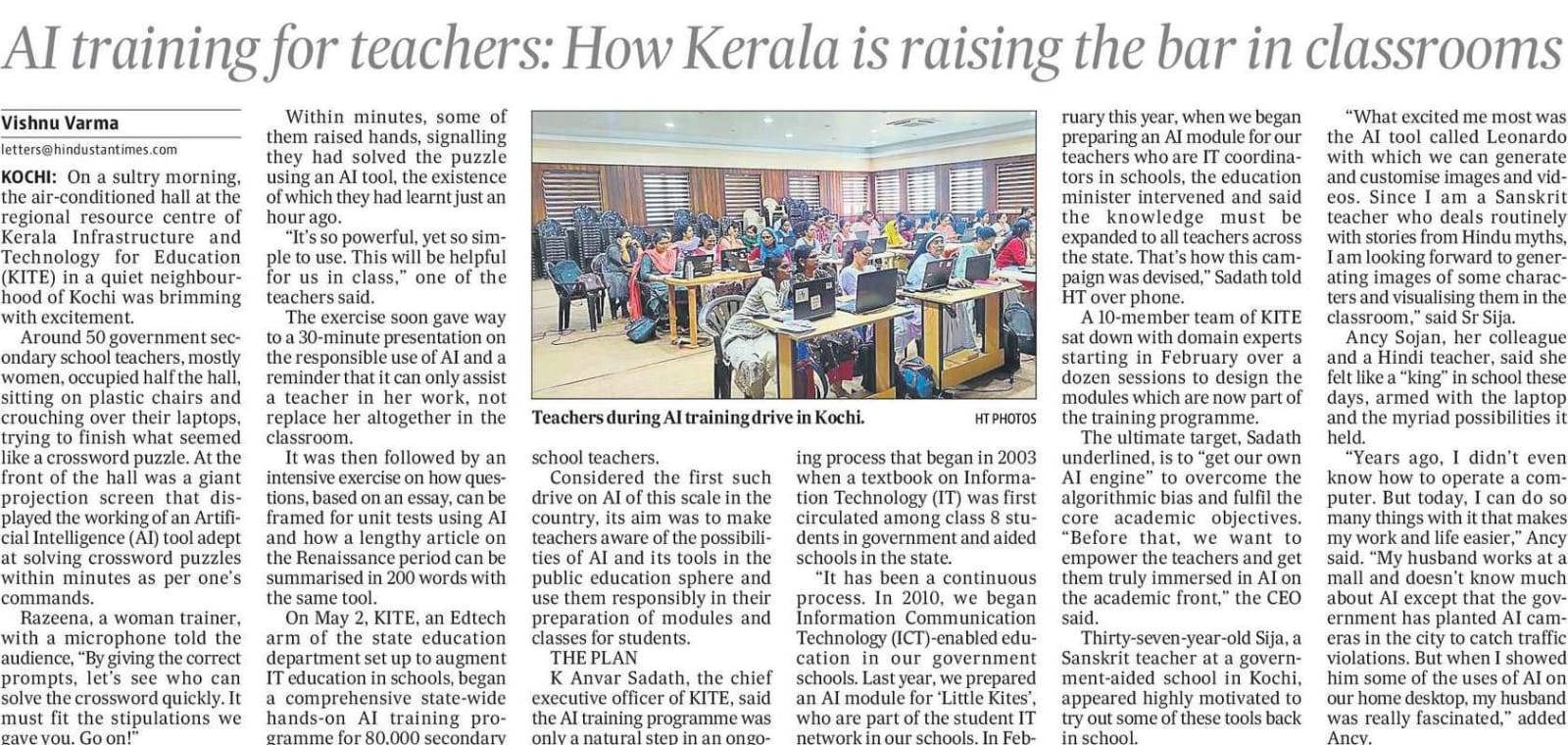
While I generally support teacher training on new technologies that can potentially improve teaching or save time, I’m curious about the specific problems AI is expected to solve. For instance, the news report mentions AI tools evaluating answer sheets, generating exam questions, and creating unit tests. Perhaps a better question is should these tasks be automated? If teachers struggle with these tasks and seek to rely on AI, there might be underlying pedagogical issues, not technological ones.
The news report also highlights using AI for summarizing PDFs and complex texts. Uncritical acceptance of AI’s potential can be detrimental, especially in education. Many of these AI tools function best, or even exclusively, in English, creating a disadvantage for students using other languages like Malayalam.
Let me be clear, I am not against AI. I use and develop AI tools, deploying them for thousands of users. I closely follow advancements in the field and strive to master them.
A few months back, a research project by a Kerala university department highlighted a decline in Malayalam language skills among students. Their study identified an increase in spelling mistakes and improper letter formation. However, The proposed solution was an AI tool using image recognition to detect these errors in notebooks. This approach misses the point. Evaluation isn’t the problem, nor is the solution technological. We should be investigating why students lack language skills.
The news report also mentions AI-generated visualizations for study materials. It would be interesting to understand how teachers currently create these materials and how AI can assist them. There’s value in teachers acquiring these skills themselves.
We should also look at what are these AI tools teachers are trained on. Kerala has a commendable history of using Free and Open Source Software (FOSS) in IT education. This approach was hard-won, especially during 2000-2010 when Microsoft aggressively lobbied for classroom digitization with their MVPs (Most Valuable Professionals) promoting MS products.
A malayalam news report says that there is plan to develop a free and opensource “AI Engine” for the above mentioned purposes and a committee has been formed for the same.
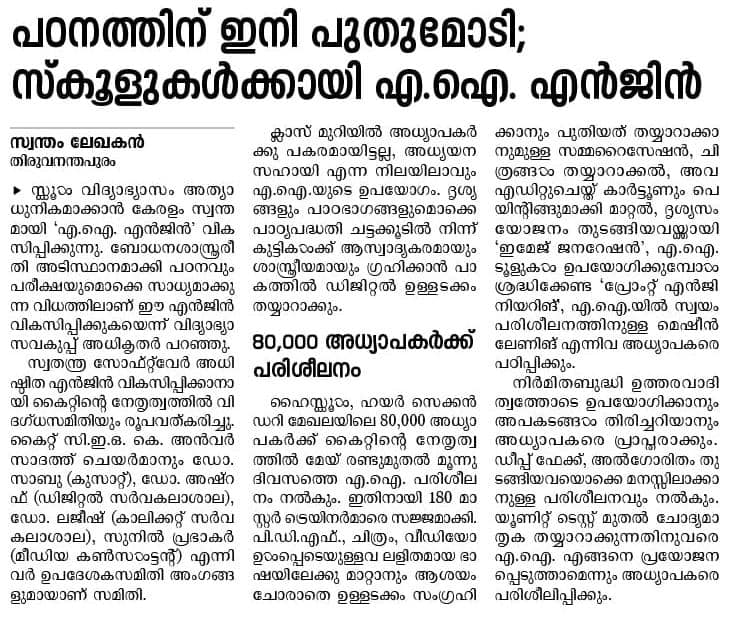
The news reports mention training students after teachers. Since the scope and veracity of this claim are unclear, the following discussion focuses on general concerns regarding AI introduction in classrooms.
There are inherent issues with incorporating fleeting technological trends into established curriculums. Let that be AI, Robotics, Blockchain, Crypto or whatever you name it. Schools shouldn’t be playgrounds for experimenting with trendy tools. A student’s time in school is finite and valuable. The curriculum should provide a balanced exposure to various subjects catering to diverse student interests, encompassing IT, arts, math, languages, sports, music, and more.
A better model for introducing such technologies would be through clubs, user groups, or special interest groups. These already exist successfully in many schools. IT@School itself has a program called ‘Little Kites’ that follows this structure. Assuming every student is interested in AI and aiming to train them all might not be the most effective approach.
While there’s nothing stopping passionate students from independently exploring AI and building software, it shouldn’t be a mandatory skill for everyone. Schools provide the foundation in core subjects like science, math, and computer science, which is the ideal springboard for future exploration of AI. Skipping these fundamentals and jumping straight to AI development hinders long-term success.
The assumption that these tools will be perpetually free is unrealistic. Running AI tools incurs significant costs in terms of computational resources and energy. Sustainability is a concern, especially considering past experiences with “free” educational software offered by companies like Microsoft.
There are additional issues to consider when implementing AI in education, including:
- Biases - This can lead to unfair or inaccurate information being presented to students. Especially when students do not have the skills to comprehend and recognize it.
- Ethical issues and abuses of AI tools such as deepfake
- Privacy concerns - Using GSuite and new email IDs won’t necessarily protect students from privacy risks.
- plagiarism - Generative AI can be misused for plagiarism as students might be tempted to use AI-generated text as their own work.
- Creative and Critical thinking- Overreliance on AI for answers or tasks could hinder the development of critical thinking and problem-solving skills. Students may become accustomed to getting solutions without understanding the underlying concepts. AI can provide formulaic solutions or complete tasks based on existing patterns. This can limit students’ opportunities to explore unique ideas or develop their own creative process.
- Communication Skills: Reliance on AI for writing projects can hinder the development of students’ own communication skills and unique voice.
The rapid pace of technological advancement can lead to a “fear of missing out” (FOMO). However, schools shouldn’t be swayed by passing trends. A well-rounded education emphasizes core subjects like science, math, and computer science, which provide a strong foundation for future exploration of AI. A thoughtful approach that prioritizes core skills and critical thinking will better equip students to navigate a world increasingly influenced by AI.
Update: Minister of Education - V Sivankutty - announced that Kerala will be the first state to tteach AI for 400,000 students in standard-7.
സംസ്ഥാനത്തെ ഏഴാം ക്ലാസിലെ 4 ലക്ഷത്തിലധികം കുട്ടികള് പുതിയ അദ്ധ്യയന വര്ഷത്തില് ഐ.സി.ടി. പാഠപുസ്തകത്തിലൂടെ നിര്മിത ബുദ്ധിയും പഠിക്കും. https://t.co/lvP0DS8s2f
— CPI(M) Kerala (@CPIMKerala) June 1, 2024
സ. വി ശിവൻകുട്ടി pic.twitter.com/Lr5CJ7fxhP
